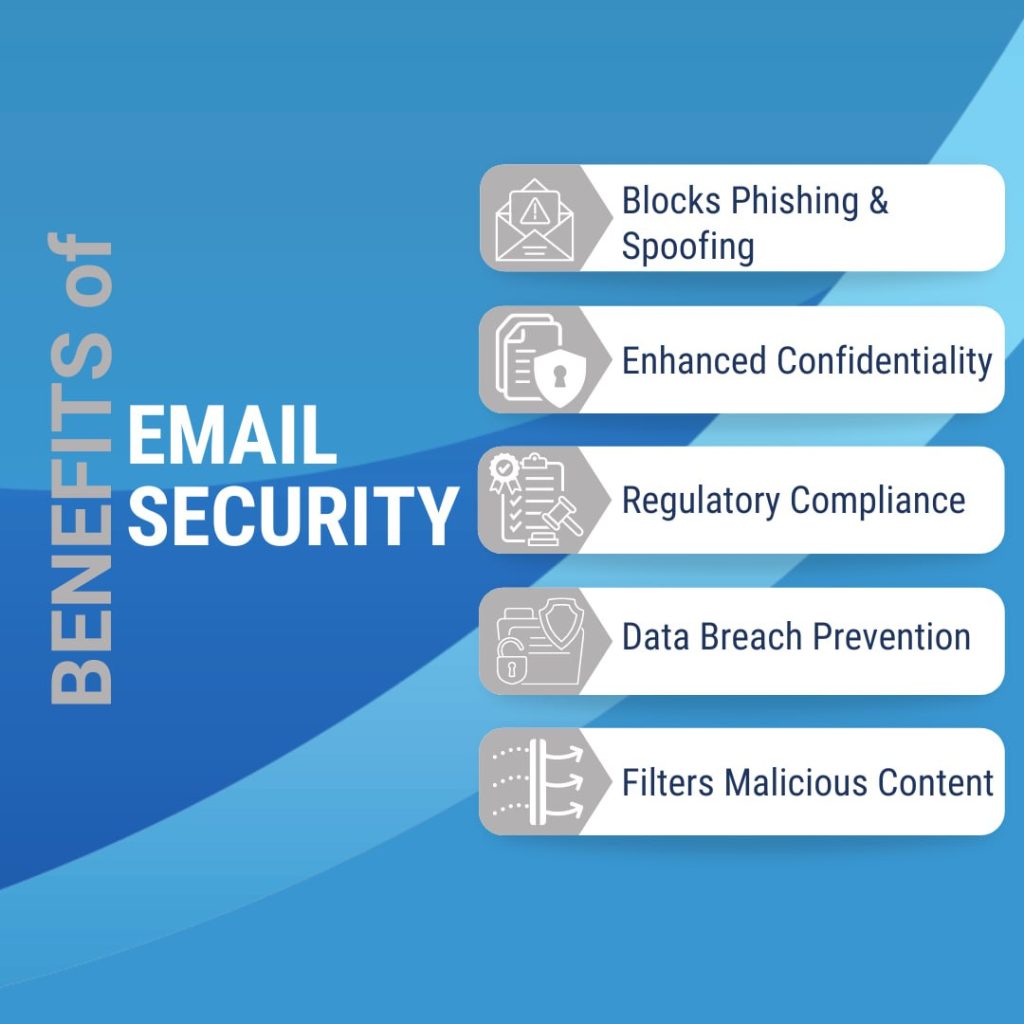Protect your email data: Expert defence against phishing and business email threats, ensuring data security and peace of mind.


Email is a common entry point for cyber threats like phishing and ransomware, posing risks to sensitive data. Robust email security is crucial for preventing financial and reputational damage and ensuring compliance with legal standards
Email servers are prime targets for botnet and DDoS attacks, potentially disrupting operations. Secure email practices are vital for maintaining server integrity, ensuring business continuity, and preserving customer trust.



Businesses need spam filters for their emails to protect against unsolicited and potentially harmful messages. Spam can range from harmless promotional content to dangerous emails containing malware, aiming to infect systems.
Spam filters serve as a first line of defence, employing techniques like content filtering, Bayesian filters, machine learning, and AI-based filters, as well as blacklist and whitelist filters. These tools not only keep unwanted emails out of inboxes but also ensure the security and efficiency of email communication.
Spam filters are essential for businesses as they help with:
When it comes to secure email services in Australia, there are several reputable options. Among them, ProtonMail stands out for its strong security features, including end-to-end encryption and servers located in Switzerland, which are protected by Swiss privacy laws. ProtonMail does not require personal information for account creation and does not log IP addresses. Additionally, it offers self-destruct features for emails, password protection, and the absence of targeted ads. A free version is available, and business accounts are supported. On the downside, ProtonMail retains some metadata and doesn’t support POP3, with IMAP and SMTP supported only through a paid service called ProtonMail Bridge.
Other notable mentions include Zoho, which is well-suited for business use, offering good security features, GDPR compliance, and collaborative tools for productivity. Zoho also supports two-factor authentication (2FA) and OAuth 2.0 for secure access. Gmail and Microsoft Outlook are also popular in Australia, offering robust features and integrations with various apps and services, although they may not offer the same level of security as dedicated secure email providers.
A secure email encryption service is a type of email service that ensures the privacy and security of your electronic communications. These services use encryption techniques to protect the contents of your emails from being read by unauthorised parties. The encryption process involves converting the email content into a code, which can only be decoded using a specific key.
One commonly used system in secure email services is the public and private key system. Each user is assigned a public key for encrypting outgoing messages and a private key for decrypting received messages. Because the private key is known only to the individual, even the email provider cannot access the data. Most secure email platforms are web-based and require you to enter a private passcode or key to encrypt outgoing emails. Recipients can access encrypted messages even without an account with the provider, usually through a one-time access code.
Quarantine Digest is a feature often found in email security systems that helps manage and review emails that have been identified as potentially harmful or spam. When an email system detects a suspicious email, instead of delivering it directly to your inbox, it places the email in a quarantine area. The Quarantine Digest is a summary report, typically sent to the user at regular intervals, listing all the emails that have been quarantined.
This report allows users to review quarantined messages safely and decide whether to release them to their inbox, mark them as not spam, or keep them in quarantine. The digest serves as a convenient way for users to manage their email security without the need to directly interact with potentially harmful content. It’s particularly useful in organisations where large volumes of email are received and stringent security measures are necessary. The concept is all about balancing security with usability, ensuring users don’t miss important emails while keeping malicious content at bay.
FAQ